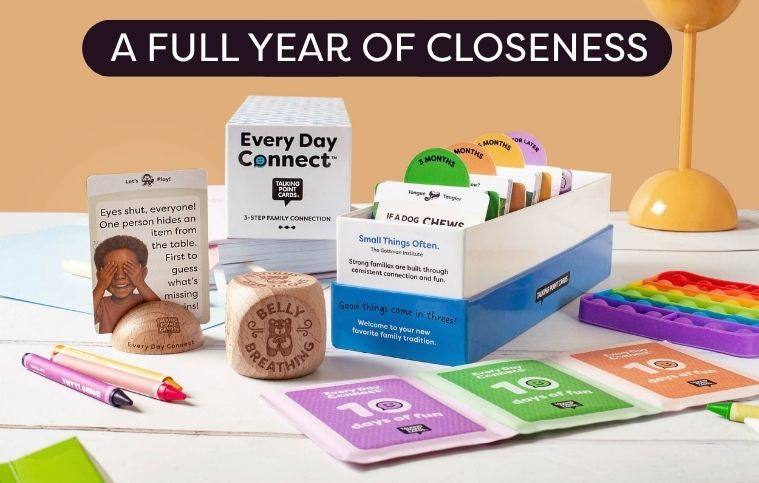SHOP
About
Why Deep Conversations Matter
Connecting with Your Child on Another Level

There are few things in life more fascinating than the mind of a child. It's this utterly fresh, uncorrupted perspective - one that can find profound wisdom in the simplest of things while being baffled by what we take as obvious.
You spend all day with your little humans, and you're certainly in their lives as much as anyone can be. But how often do you really connect?
How often do you go beyond the "How was school today?" and find out what's really going on in those miniature minds and souls of theirs?
Having real, honest-to-goodness conversations with your kids is a chance to peek behind the curtain at how their little synapses are firing.
Which is cool enough on its own - but it's about more than just an interesting psych experiment.
Real talk is a chance to build real connection, teach invaluable social skills, and give kids the emotional nourishment to truly thrive.
Build Bonds That Will Last a Lifetime

Kids spend their days [in] constantly changing environments, interacting with different people at every turn - friends, teachers, bullies, random people at Target - and internalizing all of those experiences and relationships in a profound way.
Your bond with your child is the foundation for everything. If they feel your unconditional love and know you have their back no matter what, it gives them a resilience that lets them take on any challenge or rejection. When they feel misunderstood or alone, the can escape in their
minds.
And real conversation is the mortar for that foundation. Simply put, regular heart-to-hearts bond you together [run-on sentence example] on an emotional level that sinks into their consciousness and lasts forever. Kids who have rich dialogues with their parents feel understood - they know their parent gets their perspective and cares about what they think and feel. It's priceless.
"My mom always took the time to ask me real questions and let me talk - she really listened without judging or preaching."
-Tim Urban reflecting on his childhood
The funny thing is, kids' personalities don't really form until around age 7. So in the first few years of life, your daily convos are helping to construct their inner self from the ground up. The neuroscience backs it up: high-quality parent-child conversations are [key] to fostering crucial developmental skills like self-regulation, empathy, and resilience.

Give Them a Voice and Truly Hear What They Have to Say
One of the deepest human needs is simply to feel heard and understood. Feeling voiceless, like no one cares what you have to say, is a special form of inner hell. Just ask any frustrated adolescent.
Once they get to a certain age, kids are incredibly observant and have fascinating (and sometimes hysterical) thoughts about the world around them - from their awe at things we take for granted, to their mind-blowing takes on subjects no adult would think twice about. If you
really listen with an open mind, you might find yourself amazed at some of the insights and perspectives they come up with.
When you give your child the space and receptive presence to fully express themselves without cutting them off or shutting them down, you're giving them a affirming voice and showing that their thoughts and feelings matter. If your life is anything like mine, your to-do lists probably beckon constantly and getting sucked into your phone is all too easy. But letting yourself get present for your kids by looking them in the eye and listening to what's on their mind does worlds of good in making them feel heard and valued.
"If parents wonder why the streams are bitter, look at the sources of the springs."
- Chinese proverb
Communication Skills for Life

Above all, regular deep conversations teach kids one of the most valuable and transferable life skills out there: communication.
Beyond just hearing their perspective, letting your child hold court and practice articulating their authentic thoughts and feelings gives them a chance to flex and develop their communication abilities from an extremely early age. Being a great communicator opens all kinds of doors, both personal and professional. Just think of all the top-level leaders, stand-out creatives and anyone who has to regularly win over rooms full of people. Chances are they're great communicators.
By nurturing your child's voice and communication abilities through real back-and-forth dialogue, you're equipping them to confidently engage with others and advocate for themselves throughout life in a way that might otherwise take much, much longer to develop. It's an underappreciated superpower that can make an enormous difference.

A Journey Into Their Inner World
The upside of having real open-ended conversations with your kids goes beyond even the priceless social-emotional benefits - it's a chance to glimpse an entirely different world.
Literal decades of neural pathways and associations separate our brains from our children's. To them, the world is totally new and unmarred - meanings haven't been concretized, biases haven't solidified, rigid beliefs haven't formed. Everything is seen through a beautifully untainted
lens.
Watching how their minds interpret things we've long taken for granted is almost like an adult rediscovering the world for the first time. It can be weird, uncomfortable or sad ("Wait, why are we OK with all the senseless cruelty and violence in the world?") Or it can give you childlike
whimsy and wonder like you haven't felt since you were little ("Wow, ants really are like tiny people living in an entire city under our feet!").
"Kids don't follow the same sense memory pathways - they're actually experiencing a whole new version of reality."
We adults are trapped in our neural grooves, endlessly interpreting life through the same mental models. But our kids' thought processes are utterly fresh. Getting a peek into their unique perspective really is to see the world anew.
So How Do You Get Kids to Open Up?

Alright, so real talk with your kids is great in theory. But then, they're kids - and often tight-lipped little beings.
By no means is it easy, but there are things you can do to foster an environment for open conversation:
Ask good, open-ended questions (and lots of follow-ups!)
As parents, we tend to do a lot of telling and lecturing. Role reverse by asking questions that go beyond yes or no - questions that get them talking freely. "What was the funniest part of your day today?" or "What made you most happy/sad/etc. at school this week?" Follow up with, "What did you think about that?" or "How did that make you feel?"
Meet them where they are Get on their level - literally.
Put down your phone and make eye contact. If there are distractions, turn them off or go somewhere private. Speak their language - adjust your tone and vocabulary to your child's development level.
Hear them out without judgement
Kids won't open up if they feel criticized, dismissed or preached at. No matter how silly or even uncomfortable the subject, listen with an open,
non-judgemental ear. That neutral safety gives them the freedom to express themselves fully.
Share your own stories and memories from childhood
Let your guard down and open up about your own childhood experiences, hopes, fears, embarrassing moments, etc. It models vulnerability and helps them feel seen and understood.
Give them space to share freely
A big part of it is just allowing pauses and awkward silences so they can find their words. Avoid swooping in to finish their sentences so they feel their voice and train of thought matters.
Check your reactions
Be aware that your words, tone and body language don't shut them down out of discomfort or impatience. Stay focused and let them share fully.
Make it a true two-way conversation
While they need to feel heard, conversation is a two-way street. Ask follow up questions that show real interest and volley the ball back by circling back to share your side afterwards.
Keep it positive and have fun!
Deep conversations don't have to be all heavy and serious. Use humor, laughter and bring an overall light energy. Nobody wants to open up to someone grilling them.
The good news is, kids actually tend to want to share, play and imagine out loud - that's their natural inclination! As parents, our job is to simply hold space, listen with an open heart and watch as their inner worlds blossom before us.

Parenting is About Connection
At the end of the day, having rich dialogues with your kids is about fostering deep bonds and mutual understanding. It's one of the most golden opportunities to nourish your child's emotional, social and psychological well-being.
Between our hurried modern lives and the endless distractions everywhere we turn, it's all too easy to live on the surface with our kids and miss those precious windows into their inner psyche. But making time to pause, look them in the eyes and really converse does worlds of good.
It shows you care about what's going on inside their blossoming minds and souls. It gives them a voice and a skill for life. And it's a direct line to experiencing the world with fresh, unclouded eyes.
More broadly, it's a way to simply be with your child and bask in the present beauty of their existence. Because as every parent knows (and I try to remind myself daily), their childhoods are terrifyingly fleeting. Those little minds race on at warp speed.
But deep, engaging conversations - really listening to understand who our kids are - freeze time in the sweetest way. It's a sacred daily ritual to cherish the purest forms of your children while you can. And boy, when you stop to converse and connect with them on that soulful level, is
when you really feel #blessed.
So yeah, put down that dang phone (parent advice is never complete without that one). Stop and smell the roses, enjoy your kids for who they currently are and let them put some perspective in your life.
Having real, engaging conversations with your child:
-
Builds lifelong emotional bonds that foster resilience
-
Gives them a voice and feeling of being heard/understood
-
Teaches invaluable communication skills
-
Provides a fascinating window into their unique perspectives
-
Lets you experience the world with fresh, childlike wonder
-
Allows you to truly be with your child in sacred moments
The benefits to parent-child conversations are profound on so many levels. Chatting freely with your kid doesn't just check a box - it nurtures their developing soul. So put a little heart into really conversing with your children. Those deep connections, more than anything, are what parenting is all about.
LIKED THIS ARTICLE?
SIGN UP FOR MORE!






